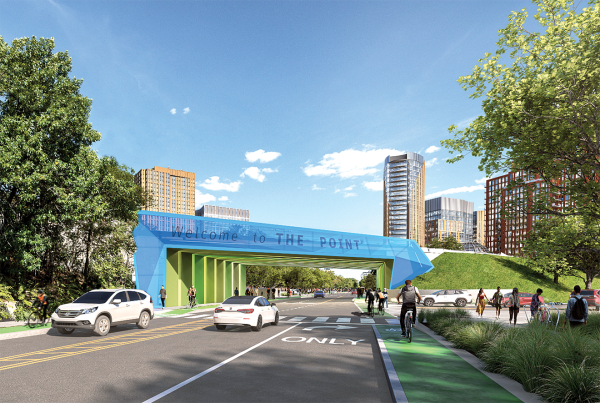July 19, 2023

A rendering of Dorchester Bay City, as seen from the JFK/UMass MBTA Station sidewalk. Image via Accordia Partners
The master plan for the $5 billion Dorchester Bay City project, which aims to remake Columbia Point into a commercial and residential hub just steps from the Red Line, is on track to head before the board of the Boston Planning and Development Agency in August.
The project last week received the approval of the Boston Civic Design Commission, a panel focused on architectural plans and a typical precursor to a project going before the BPDA’s board.
Next up on the calendar is a July 26 virtual meeting that will be hosted by the BPDA with a focus on mitigation and updates. The meeting starts at 6 p.m.
Dorchester Bay City’s top two developers, Kirk Sykes and Dick Galvin of Accordia Partners, view it as a defining project and envision a timeline of 10 to 15 years to build 21 buildings across 6 million square feet. The master plan is an overarching proposal; the buildings will need individual signoffs.
The developers are four years into their timeline, a span that featured multiple community meetings, tweaks to the project, and additions to the 36-acre proposal, including the home of the Boston Teachers Union, which is building a new headquarters, and the Santander Bank building on Morrissey Boulevard.
“We’re incredibly thankful for the support of the communities of Dorchester and South Boston, and also people’s patience,” Sykes said. “These big projects take time and we’d like to see them happen fast, but they don’t. That partnership is an ongoing one that will take place over the next 21 buildings. This is a project we hope everybody feels some pride of authorship for and the benefits we’re able to leverage will help a lot of people.”
Sykes recalled the first meetings on what community residents wanted to see, from a boardwalk down to the water and preservation of green space at the water’s edge. “All those ideas came out of the community and have matured, with the help of the city and state, and now will be a reality,” he said.
If the project receives BPDA approval, an alphabet soup of agency approvals will lie ahead, from the state Department of Transportation (MassDOT) to the Department of Conservation and Recreation (DCR).
The development team is hoping to break ground next spring or summer, with a large amount of infrastructure work that needs doing. The ground level must be raised five feet to mitigate projected sea level rise and help protect the peninsula. The project connects with Moakley Park, which is shared by Dorchester and South Boston.
The project is also meant to be a catalyst for roadway fixes and upgrades to JFK/UMass MBTA Station, a hub that serves the Red Line and three commuter rail lines, as well as buses to Forest Hills and Kenmore Square, and shuttles to the UMass Boston campus and the JFK Presidential Library and Museum.
The affected roads include Morrissey Boulevard, Mt. Vernon Street, and the locally despised rotary, Kosciuszko Circle. The project will seek federal infrastructure dollars as it proceeds apace.
“Big projects tackle big challenges and that’s our objective here,” Sykes said.
The project also calls for a new street system within its boundaries, and the creation of 1,957 new residential apartments. Twenty percent of the apartments will be designated as affordable housing.
The developers are leasing much of the land for Bay City from UMass Boston, which in 2010 bought the now-demolished Bayside Expo Center and its parking lots behind the Doubletree Hotel, a total of 20 acres.
The revenue from the project will go toward UMass Boston, which has slowly overhauled a crumbling campus over the last 20 years.
In a recent appearance on WCVB-TV, Martin Meehan, president of the UMass system, said the project is the “most important thing to happen to UMass Boston in 40 years.”
The campus serves city residents who attended public schools, he said, and with the project, they’ll get opportunities to internship at biotech and computer science companies due to their proximity of UMass Boston.
“We would develop UMass Boston certificate programs for companies that are there,” he added.


